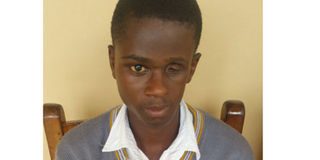Beware of cancer of the eyes among children

What started as three pimples around the eye turned out to be cancer of the eyes which cost Mohamed Kassuja his left eye.
What you need to know:
For Mohamed Kassujja, losing his eye soon after losing both of his parents was adding salt to injury. He was left in the care of his paternal grandmother who later handed him over to his paternal aunt, Mariam Nakassujja. Nakassujja’s first challenge as Kassujja’s caretaker was that of treating an unknown ailment.
Kassujja’s woes started soon after his mother’s death during childbirth.
He developed three pimples on the upper eyelid on his left eye, which were not taken seriously. Not knowing what he was suffering from, his grandmother tried to treat the pimples that had started swelling locally with sour tomatoes and other herbs.
The local concoction did not help and the eye continued to swell and cause the young boy a lot of pain until Nakassujja took over his care.
“I first took him to a clinic in Masaka but we were referred to Mulago hospital for diagnosis. That was in 2004,” narrates the aunt.
At Mulago, Kassujja was immediately admitted as the doctors tried to diagnose his ailment. The once simple pimples were now a swollen eye that caused so much pain that he had to rely on pain killers to get any relief or sleep.
“It took us three months to know that he had cancer of the eye,” recounts Nakassujja. She adds that learning that he had cancer was devastating. It sounded like a death sentence.
The diagnosis
“When I got the diagnoses, I was also told we had to wait to get treatment as the doctor who would work on Kassujja was on leave. After three weeks of waiting, I decided to pack and go home,” she remembers.
During the three weeks I was waiting, others care givers around the hospital advised me that once cancer is operated on, it spreads to other parts of the body and eventually leads to death.
One morning I just packed my bags and left the hospital to go home since I was not even getting any treatment besides the pain killers.”
Hospice help
Back home Mariam resorted to herbal treatment to control the pain, which was by now oozing with pus.
“The boy was constantly crying, the swelling was too big someone had to carry it in the palms when lifting him.” Nakassujja was advised to seek help from a Tanzanian herbalist who resides in the Kampala suburb of Katwe.
“The herbalist was only after money. His concoction never relieved the situation. It was getting worse.” Her next stop was at hospice Uganda in Makindye where she found help.
“Kassujja was given morphine which reduced the pain significantly.” At the age of three years, Kassujja was subjected to radiotherapy once every week for three months. “During the time he was undergoing radiotherapy, something the size of a fist fell out of the swelling. He lost the eye but he recovered.”
According to his care giver, since then, Kassujja, who is now in Senior One at Kawanda Senior School has not had any cancer-related problems ever since.
Expert’s take
Catherine Lisa Irumba, a clinical officer specialising in palliative care at Hospice Uganda says Kassujja had a type of cancer called Retinoblastoma, a type that affects the eyes.
“This type of cancer is found mostly in children between one to five years old. Mainly hereditary, this cancer is treatable and curable especially when detected early.”
Research by the departments of Ophthalmology and Pediatrics, Mbarara University of Science and Technology, shows that boys seem to be the most affected; 51 per cent of the sampled cases were boys.
With this particular cancer, Irumba says the symptoms are mistaken for bacterial infections. Irumba therefore cautions that persistent painless red eyes be regarded suspiciously and seriously.
Likely symptoms
• Vision problems, more specifically blurred vision.
• Redness of the white part of the eye.
• Bleeding from the eye.
• Bulging of the eye. The swelling starts from inside the ball affecting the outer part of the eye as well.
• A pupil that doesn’t get smaller when exposed to bright light.
• Different/unusual colouration in the eye.




